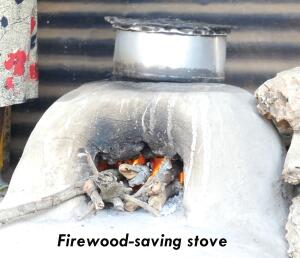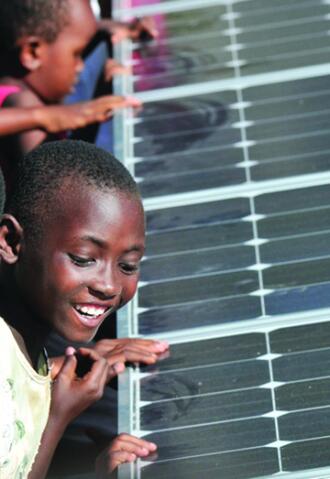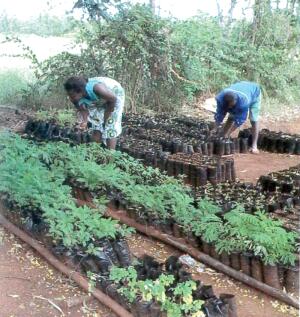Combating Climate Change in Mozambique
Students in the Community Development Program at One World University (OWU) acquire the skills needed to mobilize rural communities in rising from extreme poverty. The challenges they face as professionals will be many, not the least of which are the added obstacles of drought, flooding, and other impacts imposed by climate change.
The people who live in the vicinity of OWU are very poor and barely scrape by to survive. When the local harvest fails for any of a number of reasons, the population resorts to cutting down trees to make and sell charcoal in the capital Maputo. The hillsides surrounding the villages, formerly lush with vegetation, have thus become increasingly bare. It is only a matter of time before the forests are completely cut down, leaving the population with nothing at all.
In response to this situation, the OWU community development students have taken action to help the villages near their campus. Their approach has been twofold: 1) help reduce the consumption of wood and 2) replant trees to restore forest resources.
Reducing Wood Consumption
 Wood fuel meets about one tenth of the world's energy demand, with most users located in Sub-Saharan Africa, including Mozambique. It is estimated that nine out of ten people use wood as an energy source in the region. The students sought to reduce wood consumption through the introduction of two technologies: firewood-saving stoves and solar energy panels.
Wood fuel meets about one tenth of the world's energy demand, with most users located in Sub-Saharan Africa, including Mozambique. It is estimated that nine out of ten people use wood as an energy source in the region. The students sought to reduce wood consumption through the introduction of two technologies: firewood-saving stoves and solar energy panels.
The firewood-saving stoves are of a simple design, easily constructed using local clay. The stoves reduce wood fuel consumption by limiting the amount of oxygen that flows into the combustion area. This lowers the burn rate and cuts smoke emissions. The stoves also concentrate heat on the ceramic surface beneath the cooking vessel, increasing the efficient utilization of each log's BTU (British Thermal Units) value, while reducing heat loss. The impacts have included lowering wood consumption by one half to two thirds, while also slashing the amount of time villagers need to search for wood.
Duarte, a community development student who worked with the village of Porto Henrique, saw an immediate change once the stoves were introduced. "There has been a drastic reduction in the search for firewood, especially in the reduction of tree cutting for domestic purposes," he said. The stoves introduced by the students became very popular and villagers learned how easy it was to build them themselves. The idea caught on and it took only months before there were 1,000 such stoves in use near OWU
Carolina Manhique was among the stove recipients near OWU. Here is what she said about hers: "The stove helps a lot because I don't need to cut trees to have a lot of wood. Only three pieces of wood is enough to cook the food and it's very easy to cook in this stove. So before I had the stove, I used to take a long time looking for wood to cook with, but now there is no need to take a long time. I can even look around the house and find some pieces of wood and it's enough."
Solar Energy Stations
 In Mozambique, fires are lit in homes not only for cooking, but also to provide a source of light. So to further reduce wood consumption, students from OWU established six solar charging stations in local communities. The stations were utilized by 2,400 families, who each received a lantern that they were able to charge at the solar stations. Two stations were established at primary schools to allow adult literacy classes to be conducted in the evening.
In Mozambique, fires are lit in homes not only for cooking, but also to provide a source of light. So to further reduce wood consumption, students from OWU established six solar charging stations in local communities. The stations were utilized by 2,400 families, who each received a lantern that they were able to charge at the solar stations. Two stations were established at primary schools to allow adult literacy classes to be conducted in the evening.
In addition, 12 members of the local community received training to manage and maintain the stations. Children can now do their homework at night (free from smoke). Each charging interval provides light for two to three nights of use.
Planting Trees and Establishing Nurseries
Forests are a vital resource and provide habitat for local wildlife. They also help to fight climate change by sequestering carbon.
 OWU both mobilized communities to plant new seedlings and established nurseries so that the efforts could multiply. At last count, the students and community members planted more than 15,000 trees, including edible varieties such as moringa, papaya, mango, orange, leucanina, and lychee. The students also helped establish community nurseries so that the development of seedlings would expand and grow.
OWU both mobilized communities to plant new seedlings and established nurseries so that the efforts could multiply. At last count, the students and community members planted more than 15,000 trees, including edible varieties such as moringa, papaya, mango, orange, leucanina, and lychee. The students also helped establish community nurseries so that the development of seedlings would expand and grow.
